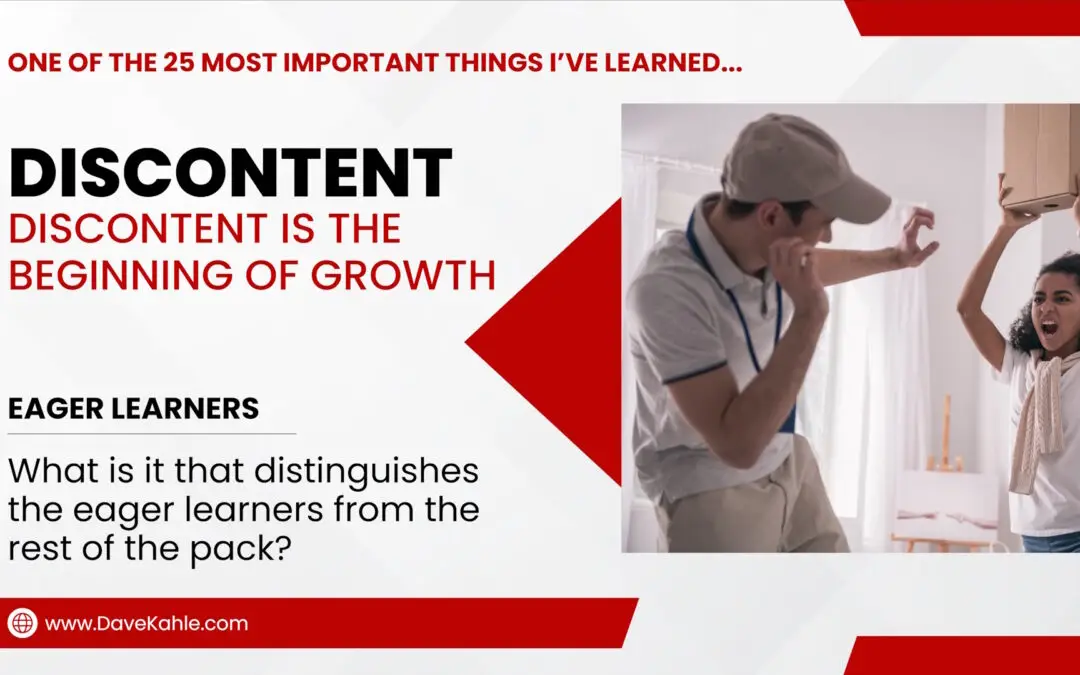For 30 years I’ve been training B2B sales forces to sell better. I’ve noticed this – that any group of salespeople, 20% to 30% are eager to learn and enthusiastic about trying some of the practices I teach. Of the remainer, some will try to apply some of the lessons, and others will fail to adjust their behavior at all.
What is it that distinguishes the eager learners from the rest of the pack? They are discontented. I have concluded that without a serious amount of discontent, there will be no significant change in behavior.
Let’s create some context. “Change in behavior” is the reason people hire someone like me to improve their salesforce. Learning, for adults on the job, is not defined as acquiring more facts, as it may be in academic circles. For adults on the job, learning always involves a change in behavior. Training is designed to equip the trainees to do something differently and to do something better. It is always defined by what they do, not what they know. I often tell audiences that I don’t care what they know. They are paid for what they do, not what they know.
Nor is learning defined by how they feel. I often have people come up at the end of a seminar and tell me that they feel great, that they have “learned a lot.” While I don’t say this because it would be rude, but I think it: “You don’t know that you have learned anything until your warm feelings express themselves in behavior change. Check in with me two months from now and tell me what you are doing differently. Then I’ll believe that you have learned.” While good feelings are nice, they, by themselves, don’t change behavior.
In sales, as in many other endeavors, becoming better means doing something differently – behaving in better ways. Behavior often bubbles up out of habit. That means changing ingrained habits. And changing habits is difficult.
Learning also requires a bit of humility. Attempting to do something better implies the realization that you are not perfect at it now. That alone scares some people off, as they are too insecure to admit that they can improve.
Not only does learning require an investment of time and often money, but the big price is emotional energy. For the most part, to change a habit means that you must work at it, and working at something so difficult requires a huge dose of energy and conviction. You’ve got to decide that you can improve, and that you should improve. That’s where most people become sidetracked. They realize that changing a habit is going to be hard, and they just don’t want to expend the energy to do so.
And that brings us to discontent. Here’s a definition: Discontent is a deep desire to change one’s circumstances by changing oneself.
Discontent arises out of wanting to change some aspect of your circumstances and makes the connection between personal or professional growth and improved circumstances. Discontent recognizes that by changing yourself you impact your circumstances.
The reason why only 20% – 30% of a training class eagerly embraces the training is that the rest don’t want to invest the amount of emotional energy it will take to change habits. They see the resulting change in their behavior as not worth the effort. When it comes down to it, they are content with their circumstances. Given the choice of investing in change or maintaining the status quo, they choose the status quo.
Over 100 years ago, James Allen recognized this phenomenon.
“Men are often interested in improving
their circumstance, but are unwilling to improve themselves, they therefore
remain bound.”
James Allen
While contentment may be a wonderful goal to chase, it squashes growth before it has a chance to germinate. I’m certainly not the first person to recognize the role of discontentment in growth. Thomas Edison said,
“Restlessness and discontent are the
necessities of progress.”
~ Thomas Edison
And Nathanial Hawthorn observed:
“The world owes all its onward
impulses to men ill at ease. The happy
man inevitably confines himself within ancient limits.”
~ Nathanial Hawthorne
If there is nothing you want to become, nothing you want to acquire, nothing you want to do better – if there is nothing you want to make better in your life, then there is no discontent. Without discontent, there is no reason to change.
Discontent is the necessary precursor to growth. And that’s one of the 25 most important lessons I’ve learned.
Related Resources



